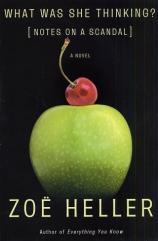Reading Group Guide
Discussion Questions
What Was She Thinking?: Notes on a Scandal

1. There has traditionally been a taboo on older women/younger men relationships. In the novel, the news media describes the affair between Sheba and Connolly as "despicable" and "unhealthy." Why do you think it has historically been viewed this way, and do you agree?
2. Heller expertly captures the insulating and sometimes claustrophobic atmosphere of academia. Give examples of this, and discuss the differences and similarities between Sheba and Barbara that brought them to teach at the same institution.
3. Connolly's unabashed admiration and innocence prove irresistible to Sheba. How are Connolly's attentions much different from the oglings of her academic colleagues since both indicate that they find her sexually attractive. Why is one so much more flattering?
4. What makes a woman like Sheba behave so irresponsibly? How easy was it for her to risk everything for the danger of the relationship? Does Sheba really think about the consequences of her actions?
5. Why does Sheba's friendship with Sue Hodges seem so ill-founded to Barbara? Why would Sheba choose Sue her as her confidant -- she never mentions Connolly's visits to Sue. How does Barbara seduce Sheba away from Sue?
6. Barbara observes that Connolly's overt effort to please Sheba is like "the cynicism of all courtship." Discuss what she means by this.
7. Barbara asks why Sheba insists on seeing Connolly as gifted and extraordinary in a sea of fairly ordinary, untalented students. Does the element of class exacerbate the forbidden nature of the relationship? Is Connolly exploiting this? What is his culpability in the situation?
8. Why, when Barbara seems like such a prim and formal person, is she initially so sympathetic to Sheba's predicament? Why is she not appalled? She says she thinks that Connolly is actually benefiting from the relationship, not being abused by it. Is it her desire for Sheba's friendship or pure feminist support? Does she take vicarious pleasure in it?
9. Sheba is presented throughout the first portion of the book as a very appealing character, seeking few of the advantages her money and class could provide. She bemoans her own lack of ambition. How much do her feelings of insecurity, boredom, and her problems with Polly affect her vulnerability to Connolly?
10. What is Barbara's reaction when she finally finds out about the affair? Is this the cause of her betrayal? Does it lead to her punishment at St. George's? Does Barbara have the right to set down the events in writing? Discuss how their friendship provides as fertile ground for mutual misunderstanding, jealousy, and treachery as does the illicit love affair.
11. At the end which woman is more sympathetic? Is Barbara friend, guardian, foe, jailer, interloper, predator? Is Sheba a victim of circumstances, an understandably bored housewife, or a selfish woman spoiled by privilege?
12. The story is finally about the two women, and the many facets of female friendship. Discuss the ways in which Heller's device of having Barbara tell the story serves to enrich the novel by revealing both women's emotional lives.
What Was She Thinking?: Notes on a Scandal
- Publication Date: August 1, 2003
- Genres: Fiction
- Hardcover: 272 pages
- Publisher: Henry Holt and Co.
- ISBN-10: 0805073337
- ISBN-13: 9780805073331








